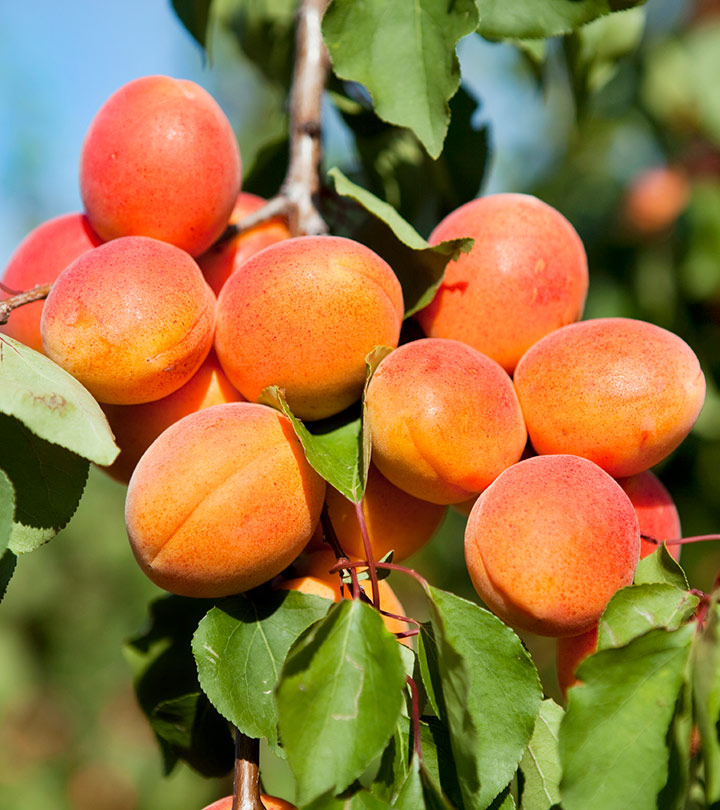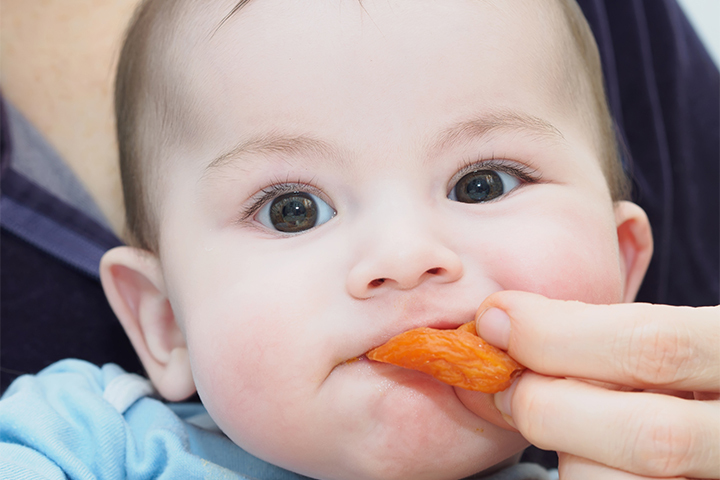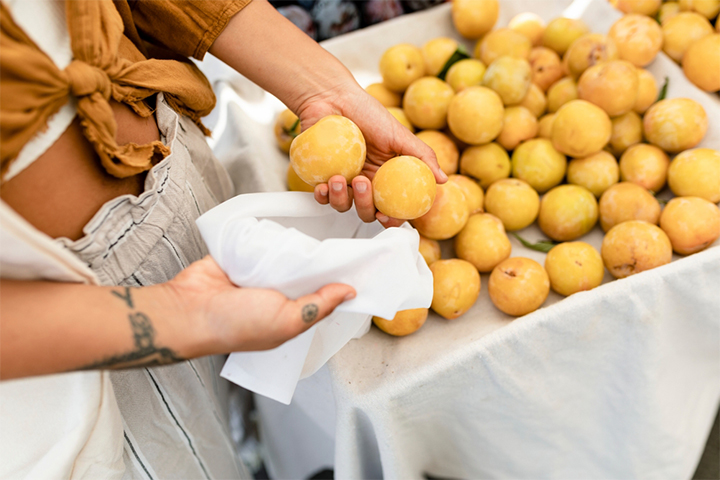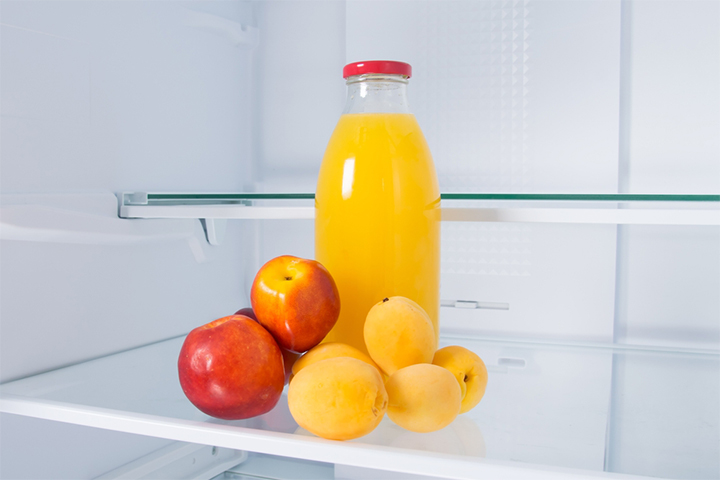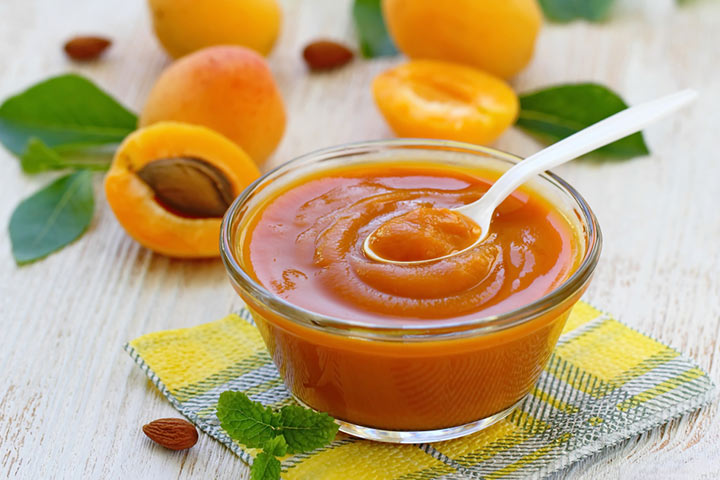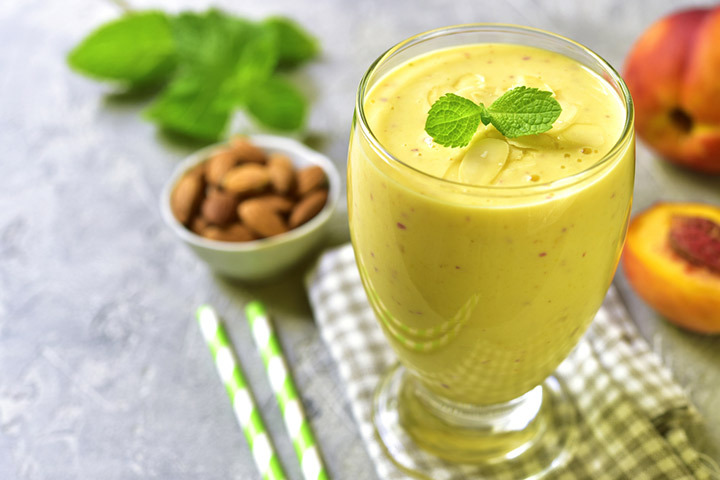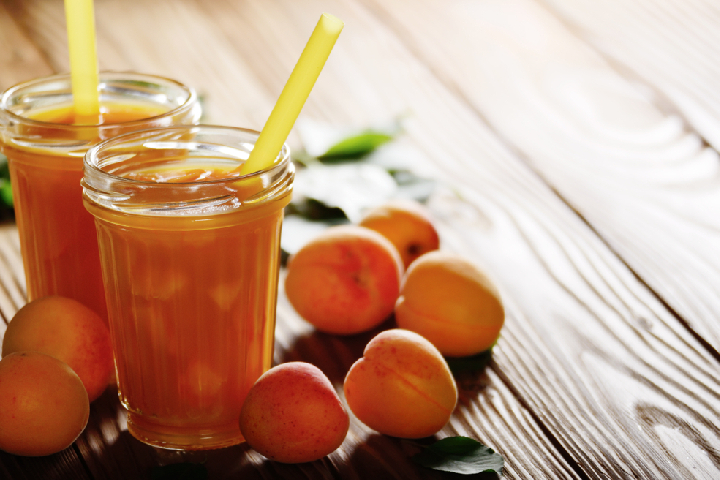Apricot, also known as “khuabni” in the Indian subcontinent, is a sweet-smelling perennialiXLasting for a very long time. fruit that has a sweet and tart flavor. In addition, it has a juicy, fibrous texture and is rich in vitamins, minerals, and antioxidantsiXThese are Natural or synthetic substances that prevent cell damage by free radicals.. Generally, apricot for babies seems a good choice, but feeding it at the right age and in age-appropriate ways is vital to ensure the baby swallows and digests the fruit well.
Read on to learn more about whether babies can eat apricots, when they can do so, their nutritional value, possible health benefits and side effects, how to select and store them, and precautions to take while feeding them to infants. This article also offers some easy and delicious apricot recipes for babies.
Can Babies Eat Apricots?
Yes, babies can eat apricots. The U.S. Department of Agriculture (USDA) suggests feeding ripe and fresh apricots to infants as a source of vitamin A. However, in general, both fresh and dried apricots can be mashed and spoon-fed to babies in an age-appropriate manner.
When Can Babies Have Apricots?
Babies can have fresh and ripened apricots as soon as they start eating solids. Most babies start solids between four and six months of age (1). However, the weaning age may not be the same for all babies. Therefore, consult a pediatrician or pediatric nutritionist about the right age for your baby to start eating apricots.
Once you have the go-ahead from the expert, you can begin serving the fruit to the baby as a homemade apricot puree made from fresh or frozen apricots.
Nutritional Value Of Fresh Apricot
The apricot is available in fresh, dried, canned, and frozen fruit forms. Below is the nutritive value of one cup (155g) of fresh and ripe apricot, with the recommended amount of nutrients as required by babies (2) (3).
| Name | Amount | RDA |
|---|---|---|
| Water | 134g | – |
| Energy | 74.4Kcal | – |
| Protein | 2.17g | – |
| Carbohydrate, by difference | 17.2g | – |
| Fiber, total dietary | 3.1g | – |
| Sugars, total including NLEA | 14.3g | – |
| Calcium, Ca | 20.2mg | 210mg (0-6 months)
270mg (7-12 months) |
| Magnesium, Mg | 15.5mg | 30mg (0-6 months)
75mg (7-12 months) |
| Phosphorus, P | 35.6mg | 100mg (0-6 months)
275mg (7-12 months) |
| Potassium, K | 401mg | 500mg (0-6 months)
700mg (7-12 months) |
| Sodium, Na | 1.55mg | 120mg (0-6 months)
200mg (7-12 months) |
| Vitamin C, total ascorbic acid | 15.5mg | 30mg (0-6 months) 35mg (7-12 months) |
| Folate, total | 14µg | 24µg (0-6 months)
32µg (7-12 months) |
| Vitamin A, RAE | 149µg | 375RAE/day (0-12 months) |
| Vitamin K (phylloquinone) | 5.12µg | 5µg (0-6 months) 10µg (7-12 months) |
Sources: U.S. Department of Agriculture and World Health Organization
Possible Health Benefits Of Apricots For Infants
Regular consumption of ripe apricots as part of a well-balanced diet can be helpful in the following ways.
- Hydrating: One cup of fresh apricot contains 134g of water. Besides, it has a good amount of trace minerals like sodium, potassium, and magnesium that help maintain the electrolyte balance of the body.
- Nutrient-dense: Fresh and ripe whole apricots (with skin) can help meet the calorie need of an infant. Besides, they are a rich source of natural sugars, multivitamins, minerals, polyphenolsiXA group of chemical substances in plants, such as phenolic acids, flavonoids, and lignane, that act as antioxidants., carotenoidsiXColored pigments found in plant-based foods that act as a precursor in the synthesis of vitamin A and protect cells from damage., cyanogenic glucosidesiXOrganic plant toxins, found in a variety of food plants and seeds, that help in plant’s defense mechanism. (4), and bioactive compounds such as phytonutrientsiXA broad term for compounds found in fruits, vegetables, grains, and beans, possessing health-promoting properties..
- Digestive health: Fresh and dried apricots have considerable amounts of dietary fiber, which adds bulk to the diet and helps in the easy passing of stools. Japanese apricot is one variety that is known to increase the frequency of defecation, a useful property in relieving constipation (5).
- Gut microbiotahealth: Whole apricot and apricot juice are rich in FODMAPs (Fermentable Oligo, Di, Mono-saccharides, and Polyols) that have prebiotic effects helpful in boosting gut microbiota (6) (7). Besides, the dietary fiber can work as a prebiotic (8).
- Immunity: Apricot fruit is known to possess antioxidant and anti-inflammatory properties (9). Both these properties are crucial to back your baby’s immune system. Some studies have shown that regular consumption of apricot kernel oil may enhance the immune system (10) (11). However, its benefits for infants are still unknown.
- Heart health: Fresh apricot and apricot juice contain phenolic compounds, such as anthocyaninsiXPlant pigments that give them their purple, blue, or red hue. and anti-inflammatory compounds, such as coumaric acid that has cardioprotective effects (12) (13). Several in vivo studies have supported the consumption of apricots for their cardio protective effects (14).
- Overall health: Apricot is known to possess antimicrobial properties that might help fight infections. The fruit also has antinociceptive properties that could promote the use of apricots as a potential nutraceutical in pain management (4).
Regular consumption of fresh apricots is beneficial, yet it has some side-effects that must be explored.
Possible Side-Effects Of Apricots In Babies
It is good to know the side effects to mitigate any problems for the baby.
- Gastrointestinal disturbances: Apricots are rich in FODMAPs. If eaten in large quantities, it could cause gastric issues such as gas, bloating, flatulenceiXAlso called farting, it is the act of releasing gas from the digestive system., and diarrhea (15). If your baby is on breast milk and is showing symptoms of coliciXFrequent, prolonged, and intense periods of crying in a healthy baby without any apparent reason., then check your consumption of apricot (16).
- Allergy: Apricot allergy is not uncommon. Its allergy can either be caused by the cross-reactivity with birch pollen (birch pollen allergy) or peach. In both cases, Oral Allergy Syndrome (OAS) is observed, and thus ingestion of apricot must be avoided. Sensitive individuals with apricot allergy tend to develop allergic reactions to some other fruits and nuts like apple, cherry, plum, and nuts (like hazelnut and walnut) (17).
- Sulfite sensitivity or allergy: Apricot, as dried fruit, is often treated with preservatives containing sulfites. These compounds are known to cause adverse allergic reactions in certain individuals depending on the residue left in the product (18) (19).
Stay cautious and reduce the chances of side effects by selecting and storing ripe apricots in an appropriate manner.
How To Select And Store Apricots For Baby Food?
Selection of apricots
- Prefer purchasing all fresh seasonal fruits, such as apricots, from a certified organic shop.
- Give preference to fresh and dried ones over frozen and canned varieties.
- Organic apricots that are tree-ripened are of high-quality. To know the difference, look for the following points.
- Pick plump, fairly firm apricots. However, while you do so, avoid picking apricots that are too firm or have a hard coat, as it indicates that they are not tree-ripened.
- The outer skin should feel delicate and velvety to touch.
- They should have an orange to yellowish-brown color with rich red inside.
- Avoid picking apricots with a green coat, as they are unripe.
- Look for cracks and white spots. If any are present on the fruits, avoid picking them.
- When shopping for dried apricots, pick brown-colored dried apricots because sulfite-treated apricots tend to appear orange.
Storage of apricots
- After purchase, store ripe apricots in the refrigerator, as cool conditions will slow down the ripening process.
- While storing, use a clean glass container or zipped plastic pouch as ripe apricots get spoiled quickly.
- Be gentle while placing apricots in a container or a bag since the fruit can get bruised easily.
- You can store unripened apricots in a paper bag until they ripen.
- Store the cut fruit for later use in a BPA-free plastic container or resealable jars made from glass. The same can be done for mashed or pureed apricots, as well.
Precautions To Take While Giving Apricot To Infants
You may follow these precautions while feeding apricot to your baby.
- Always feed ripe apricot and their products. Consumption of raw apricot (that is bitter in taste) could result in health issues due to the presence of a toxic chemical called hydrocyanic acid.
- If you are using fresh apricots, then wash them thoroughly to remove dust, dirt, and pesticide residue.
- If you want to try dried apricot, ensure that you serve it in mashed or pureed form. Its hard texture could be a potential choking hazard for babies under 24 months.
- Once you introduce apricot to your baby, follow a three to five-day wait rule to look out for any sensitivities, allergies, or intolerances. During this time, avoid including any other new food to your baby’s diet.
- If you are using canned and frozen apricots, then wait until the fruit attains room temperature before feeding it to the baby.
Apricot, when selected and stored well, can be used to prepare several homemade baby food recipes.
Apricot Baby Food Recipes
There are several apricot baby food recipes that you may like to try. However, the most simple and easy-to-prepare recipe is an apricot puree. Though can use either fresh or canned apricots, fresh apricots are preferable.
1. Apricot puree
This recipe is an ideal choice for younger babies who have just started solids. You could add breast milk or formula milk to this puree if required. For older infants, it can be mixed with other fruit purees to prepare mixed purees.
You will need:
- 1 cup fresh apricots
- 1 cup water
How to:
- Wash and peel the outer skin of the fruit. If you want, you can steam apricot before use.
- Now, remove the pit and put the fresh fruit pulp into a blender.
- Blend the apricot pulp until you receive a smooth paste. Ensure no lumps are left.
- If required, add water to attain the desired consistency.
- No added sweetener is required, as apricot can provide natural sweetness to the recipe.
Tip: It is not necessary to remove the peel of the fruit before the preparation. If you wish to serve the fruit with peel, then you need to boil the fruit for longer. However, if you want to remove it, then you can put the fruit in boiling water for five minutes and then immediately put it in cold water. This process, called blanching, turns the outer skin soft, making it easy to peel. If you have dried apricots and not fresh ones, then cut them up into pieces and boil in a little water for five minutes or until it is tender. You can now easily blend it into a smooth puree.
2. Nutty apricot and banana smoothie
This recipe can be given to the babies once they are about seven to eight months old. It can also make a healthy snack for your toddler.
You will need:
- 1 cup fresh apricots (pulp)
- 1 medium-sized banana
- 1 cup Greek yogurt
- ½ cup mixed nuts (powder)
- 1tbsp mixed nuts (finely chopped)
How to:
- Take a blender and add apricot pulp, banana, yogurt, and nuts powder to it.
- Blend everything well until you get a runny consistency. If required, add water to adjust the consistency.
- Pour the smoothie in a small cup and sprinkle with finely chopped nuts. If you want, you may also sprinkle some finely chopped apricots as well.
- Feed it to your baby instantly. Store leftover amounts in a storage container for later use.
3. Mango apricot smoothie
This recipe is best suited for seven to eight months old babies. Toddlers can enjoy it in between meals.
You will need:
- 2 medium sized mangoes
- 3 apricots
- 1 cup coconut milk or Greek yogurt
How to:
- Wash and peel the mangoes and cut them into small cubes.
- Soak apricots in a cup of warm water for about 15 minutes.
- Add mangoes, apricots and coconut milk to a blender and blend until smooth.
- You may use water or breastmilk to adjust the consistency.
- Pour in glasses and serve immediately or store in an airtight container and refrigerate.
Apricots for babies can be a healthy choice of first food as they are rich in carbohydrates, fiber, and healthy fats. Mothers may consider introducing apricots as soon as babies start eating solids. It is advisable to give apricots in small amounts initially and report to the doctor if you notice any allergic reactions. Also, give organic and fresh apricots to your child. You can try delicious and healthy apricot recipes such as smoothies and purees or add them to cakes or cookies to encourage your child to consume them.
Key Pointers
- Apricots are rich in vitamins, minerals, and antioxidants and are extremely hydrating and nutrient-dense.
- Both fresh and dried apricots are safe for babies, with the recommended age to start being six months.
- Apricots can aid in digestive health and immunity, but they also come with side effects such as gastric issues, sulfite sensitivity, or allergies.
- Ripe apricots should always be washed thoroughly before feeding them to your child, and dry apricots should be served in a mashed or pureed form.
- Follow a three to five-day waiting rule to observe any allergic reactions or adverse effects in your child.
“Watch this video for a delicious and nutritious apricot and pear puree recipe for babies. Boost your baby’s immunity with this easy to make recipe!”
